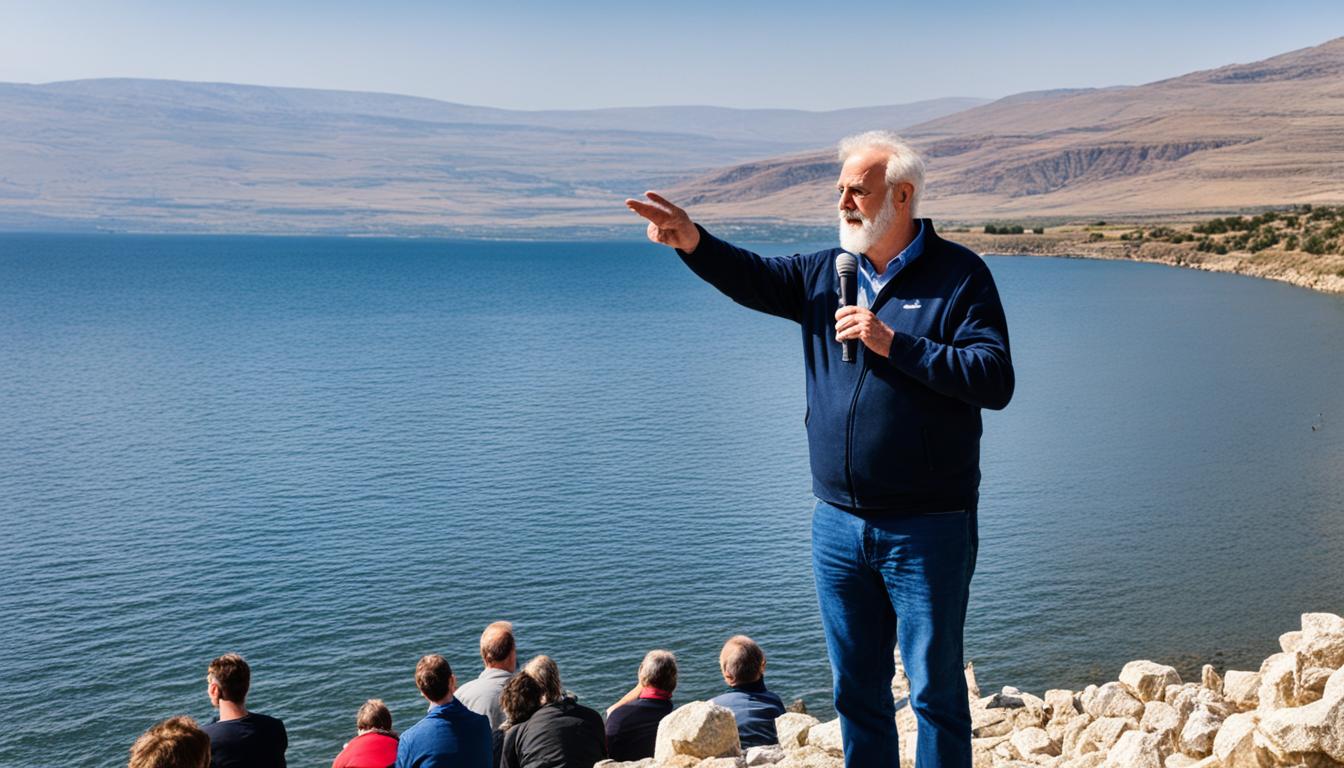Peter, whose name means “Rock,” was a disciple of Jesus and played a significant role in the establishment of the early Christian church. He had a brother named Andrew who introduced him to Jesus. Peter lived during a time of political unrest in Israel, under Roman rule. He witnessed Jesus’ ministry, crucifixion, and resurrection, and was known for his outspoken faith and leadership among the disciples. Peter preached at Pentecost, played a key role in bringing the gospel to the Gentiles, and is often referred to as the “rock” upon which Jesus built his church.
Key Takeaways:
- Peter played a vital role in the establishment of the early Christian church.
- He witnessed Jesus’ ministry, crucifixion, and resurrection.
- Peter preached at Pentecost and brought the gospel to the Gentiles.
- He is often referred to as the “rock” upon which Jesus built his church.
- Peter’s life demonstrates the transformative power of faith in Jesus Christ.
Early Life and Occupation
Before becoming a disciple of Jesus, Peter led a humble life as a fisherman. Unlike many prominent figures of his time, Peter did not have formal education or extensive training. However, his destiny took a surprising turn when God called him to be a “fisher of men.”
During his time with Jesus, Peter underwent a remarkable transformation. He grew from an uneducated and sometimes fearful man into a courageous and faithful apostle. This transformation led Peter to abandon his livelihood as a fisherman and become a full-time follower of Christ. His dedication and commitment played a pivotal role in the establishment of the early Christian church.
Though Peter’s occupation may have seemed ordinary, his journey with Jesus and the subsequent impact he made on the world demonstrate the profound significance of an individual’s calling and faith.
Strengths and Weaknesses
Peter, one of the disciples of Jesus, possessed both strengths and weaknesses in his journey of faith. Let’s explore some of these aspects:
Strengths
Peter was known for his unwavering enthusiasm and excitement in his relationship with Christ. He displayed a deep commitment to following Jesus and placed God first in his life. Peter’s dedication and wholehearted obedience to the teachings of Jesus made him a powerful example for other believers to follow.
Throughout his ministry, Peter exhibited remarkable leadership qualities. He played a prominent role among the disciples and was often entrusted with crucial responsibilities. Peter’s boldness and courage allowed him to step forward and proclaim the gospel fearlessly, leading many to faith in Jesus.
“But in your hearts revere Christ as Lord. Always be prepared to give an answer to everyone who asks you to give the reason for the hope that you have.”
— 1 Peter 3:15
Weaknesses
However, Peter was not without his share of weaknesses. At times, he acted impulsively and spoke without thinking, leading to hasty decisions. One notable instance was when Peter rebuked Jesus for predicting His crucifixion, to which Jesus responded, “Get behind me, Satan!” (Mark 8:33) Peter’s impulsive nature reminded us of the need for caution and thoughtfulness in our words and actions.
Furthermore, Peter experienced a moment of great weakness when he denied knowing Jesus three times. Overwhelmed by fear, Peter succumbed to the pressure and temporarily turned away from his faith. Yet, this humbling experience ultimately led to his repentance and spiritual growth. It serves as a reminder that even those with strengths can falter, underscoring the importance of humility and reliance on God’s grace.
Repentance and Growth
Peter’s weaknesses did not define him. With a repentant heart, he grew in maturity and became a pillar of faith, imparting important teachings to believers. In his first letter, Peter emphasized the need for humility, endurance in trials, and love for one another. His own experiences of weakness and restoration contributed to the powerful messages contained within his teachings.
“Humble yourselves, therefore, under God’s mighty hand, that he may lift you up in due time.”
— 1 Peter 5:6
Peter’s Teachings
Peter’s teachings continue to resonate with believers today. His letters provide guidance, encouragement, and admonishment, reminding us of the importance of living out our faith in the face of adversity. Through his words, we are encouraged to remain steadfast in our commitment to Christ, displaying love, humility, and resilience.
Amidst his weaknesses, Peter exemplifies the transformative power of God’s grace and the potential for growth and change within all individuals. His journey serves as a testament to the redemptive work of Jesus and the capacity for believers to overcome their shortcomings through faith.

| Strengths | Weaknesses |
|---|---|
| Enthusiasm and commitment in his relationship with Christ | Impulsive behavior |
| Leadership qualities and courage in proclaiming the gospel | Denial of Jesus three times |
| Inspired many with his teachings and actions | Inconsistency in faith |
Peter’s Significant Acts and Events
Peter’s impact in the Bible is evident through his involvement in numerous significant acts and events. As one of Jesus’ disciples, Peter witnessed and participated in key moments that shaped the early Christian church. His unwavering faith and leadership played a pivotal role in spreading the gospel message and establishing the foundation of Christianity.
-
Called by Jesus and Witnessed the Transfiguration
Peter was personally called by Jesus to be one of His disciples, leaving behind his occupation as a fisherman. This initial encounter marked the beginning of a transformative journey for Peter, as he would become a prominent figure among the disciples.
Furthermore, Peter was one of the privileged few who witnessed the Transfiguration, a transcendent moment on a mountaintop where Jesus’ divine glory was revealed. This extraordinary experience solidified Peter’s belief in Jesus’ deity and further cemented his pivotal role in spreading the message of salvation.
-
Preached at Pentecost and Conversion of Thousands
One of Peter’s most impactful acts was his powerful sermon at Pentecost, a Jewish festival. Filled with the Holy Spirit, Peter boldly proclaimed the Gospel, resulting in the conversion of thousands of people. His impactful words and testimony led many to believe in Jesus and laid the foundation for the early growth of the Christian church.
-
Instrumental in Bringing the Gospel to the Gentiles
Peter played a crucial role in breaking cultural barriers and expanding the reach of the Gospel beyond the Jewish community. Through a divine encounter, Peter learned that God’s salvation was not exclusive to the Jews but extended to the Gentiles as well. This revelation prompted Peter to visit the Gentile centurion Cornelius, leading to the conversion of Cornelius and his household. Peter’s acceptance of the Gentiles marked a significant turning point in the early church, emphasizing the inclusivity of the Gospel message.
-
Performed Miracles and Demonstrated God’s Power
Peter’s ministry was marked by the demonstration of God’s power through miracles. He healed a lame man at the temple gate, causing a stir among the people. The miraculous healing not only brought physical restoration but also served as a testament to the authority and power of Jesus. Additionally, Peter raised Tabitha (Dorcas) from the dead, showcasing the influence of the Holy Spirit in his life and ministry.
-
Affirmed Jesus as the Messiah and Leader among the Disciples
Peter’s confession of Jesus as the Messiah, the Son of the living God, was a pivotal moment that further emphasized his significant role in the biblical narrative. Jesus acknowledged Peter’s revelation and declared him as the rock upon which He would build His church. This affirmation solidified Peter’s leadership among the disciples and his instrumental role in spreading the teachings of Jesus.

Peter’s Denial and Restoration
One of the most well-known aspects of Peter’s life is his denial of Jesus. He denied knowing Jesus three times out of fear and self-preservation. However, after Jesus’ resurrection, He specifically appeared to Peter multiple times, restoring their relationship and commissioning Peter to feed His sheep. This restoration highlights God’s forgiveness and grace, showing that even when we fail, we can turn back to Him and be restored.

Despite betraying Jesus in his time of need, Peter’s relationship with Jesus was not permanently damaged. Jesus extended His mercy to Peter, demonstrating His unconditional love and forgiveness. This profound act of restoration emphasizes the importance of repentance and the transformative power of Jesus’ redemptive work.
“Feed my lambs… Take care of my sheep… Feed my sheep.”
These were the words spoken by Jesus to Peter during one of their restoration encounters. Through these words, Jesus reaffirmed Peter’s role as a leader in His church, entrusting him with the responsibility of tending to His followers. This reaffirmation not only restored Peter’s faith but also solidified his commitment to spreading the gospel and caring for the spiritual needs of others.
Throughout the rest of his life, Peter remained dedicated to his calling, proclaiming the message of salvation and fulfilling his role as a foundational figure in the early Christian community. His personal experience of denial and restoration provided him with a unique perspective and a deep understanding of God’s unfathomable grace and love.
Peter’s Denial of Jesus: A Moment of Weakness
Peter’s denial of Jesus should be seen as a moment of weakness rather than a reflection of his character. Overwhelmed by fear and uncertainty, Peter succumbed to the pressure and denied his association with Jesus. This momentary lapse serves as a reminder that even the most devoted followers of Christ are susceptible to human weaknesses.
| Event | Description |
|---|---|
| Peter’s Denial | Peter denies knowing Jesus three times before the rooster crows. |
| Jesus’ Restoration | Jesus appears to Peter after His resurrection, restoring their relationship and commissioning Peter to feed His sheep. |
| Impact | Peter’s denial and subsequent restoration highlight God’s mercy, forgiveness, and unwavering love. |
Peter’s denial and subsequent restoration serve as a powerful testament to the transformative power of Jesus’ love and forgiveness. His journey from failure to redemption inspires others to seek repentance and embrace the grace offered by Christ. Peter’s story reminds us that no matter how far we may have strayed or failed, God’s forgiveness is available to all who turn back to Him.
Peter’s Impact Beyond the Gospels
Peter’s impact extended beyond the Gospels. He wrote two remarkable letters, 1 Peter and 2 Peter, which continue to provide guidance and encouragement to early Christians to this day. These letters, included in the Bible, serve as a source of inspiration for believers around the world.
“Therefore, rid yourselves of all malice and all deceit, hypocrisy, envy, and slander of every kind. Like newborn babies, crave pure spiritual milk, so that by it you may grow up in your salvation.”
In his letters, Peter addresses various topics, including faith, suffering, and the return of Jesus. He shares his firsthand experiences and offers practical advice to believers facing challenges and trials. Peter’s teachings resonate with readers as they navigate their own faith journeys and seek to live out their beliefs in a challenging world.
Furthermore, Peter’s own transformation and growth in his relationship with Jesus serve as an inspiring example of God’s transformative power. Despite his past failures and shortcomings, Peter’s letters reflect his deep understanding of God’s grace and love.
“But you are a chosen people, a royal priesthood, a holy nation, God’s special possession, that you may declare the praises of him who called you out of darkness into his wonderful light.”
Peter’s impact goes beyond his role as a disciple and leader in the early church. His letters continue to touch lives, providing wisdom and encouragement for believers throughout the centuries. They remind us that faith can be lived out authentically, even in the midst of challenges, and that God can use imperfect individuals like Peter to accomplish His purposes.

| Key Lessons from Peter’s Letters | Scripture References |
|---|---|
| Pursuing holiness in all aspects of life | 1 Peter 1:15-16 |
| Enduring persecution and suffering with hope | 1 Peter 4:12-13 |
| Living as a witness for Christ in a hostile world | 1 Peter 2:12 |
| Understanding the redemptive work of Jesus | 1 Peter 2:24 |
| Being alert to false teachings and false prophets | 2 Peter 2:1-3 |
Conclusion
Peter’s life in the Bible exemplifies the transformative power of Jesus Christ. As an uneducated fisherman, Peter’s journey from disciple to key leader in the early church is a testament to the profound impact of his teachings. Despite his strengths and weaknesses, Peter’s ultimate restoration stands as a vivid portrayal of God’s boundless grace and redemption.
Throughout history, Peter’s legacy has inspired countless individuals to embrace their imperfections and strive to be instruments in God’s hands. His significance in Christianity continues to resonate, serving as a reminder that our flaws do not define us. Through faith and trust in Jesus Christ, like Peter, we can navigate the challenges of life and fulfill our divine purpose.
In reflecting upon Peter’s life, we are encouraged to embrace the call to follow Christ wholeheartedly. By studying his teachings and the transformative power of his experiences, we can gain a deeper understanding of the profound impact that one person’s faith can have on the world. As we internalize Peter’s legacy, may we be inspired to live lives marked by God’s grace, proclaiming the transformative love of Jesus to all.
FAQ
Who was Peter in the Bible?
Peter, also known as Simon Peter, was a disciple of Jesus and played a significant role in the establishment of the early Christian church.
What was Peter’s occupation before becoming a disciple of Jesus?
Peter was a fisherman by trade.
What were Peter’s strengths and weaknesses?
Peter was known for his enthusiasm and commitment to following Jesus, but he was also prone to impulsive behavior and speaking before thinking.
What significant acts and events was Peter involved in?
Peter preached at Pentecost, performed miracles, played a key role in bringing the gospel to the Gentiles, and was a leader among the disciples.
What is the significance of Peter’s denial and restoration?
Peter denied knowing Jesus three times but was later restored by Jesus, highlighting God’s forgiveness and grace.
What impact did Peter have beyond the Gospels?
Peter wrote two letters, 1 and 2 Peter, which provide guidance and encouragement to early Christians and continue to inspire believers today.
What is Peter’s legacy?
Peter’s life in the Bible showcases the transformational power of Jesus and serves as a reminder that imperfect individuals can be used for God’s purposes.







